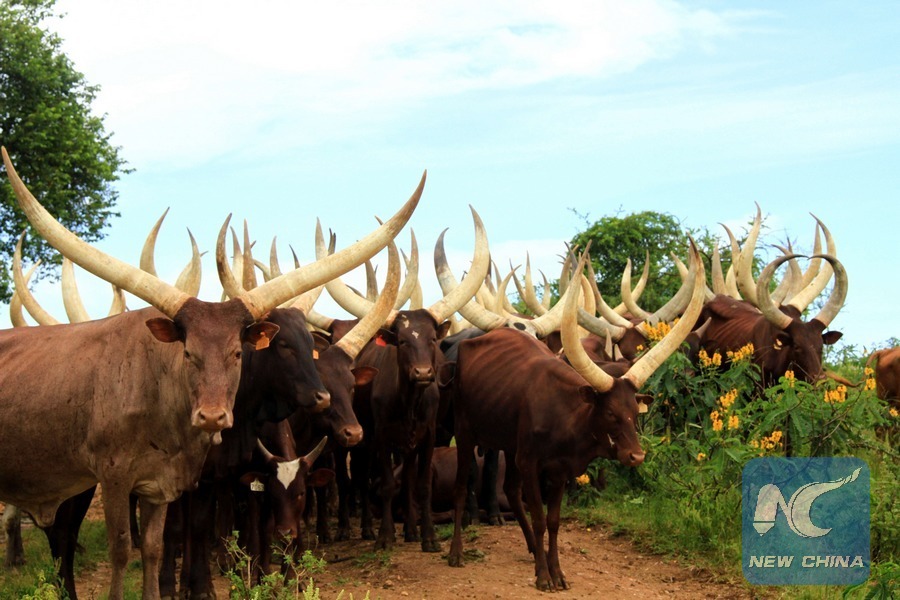
The photo shows a herd of Ankole long-horned cattle, a cattle breed endemic in Africa. (Xinhua/Yuan Qing)
by Gloria Nazombe
LUSAKA, Sept. 13 (Xinhua) -- Rearing cattle amongst the Ngoni people in Malawi, once a pride custom, is prone to extinction.
As per custom, a Ngoni man's riches and power is determined by how many cattle he has, unlike other tribes and culture where houses, money and cars are the determinants of success.
According to the tradition which dates back to the 19th century, the Ngoni people always brought home cattle from every tribe they conquered. It is believed that they are warriors and the cattle symbolized their power.
Inkosi ya Makosi (King of kings) Mbelwa IV is one of the dignified Ngoni chiefs from Malawi.
"Milk and meat is a symbol of prosperity. Cattle provide the best and large quantity of milk and meat. Therefore, if one has cattle and a number of them for that matter it only implies one thing, the man is filthy rich," the traditional leader said.
According to him, an Ngoni man with a head of cattle signifies what a great warrior he is and that it is easy for such a man to attract women.
According to Ngoni tradition, during coronation, the would-be-chief is anointed with a bull's bile on his forefront, a move that symbolizes power descending to his whole body from the ancestors.
The same is done when he dies and it shows that the spirit is still powerful and will also be transferred to the next king.
Mandlase Jere from Edingeni in Mzimba district, an area where the Ngoni people are highly concentrated, said Ngoni women like powerful men. "Any man who brought cattle home from war gave us hope for our safety. So we flock to such a man," Jere said.
She added that it was a source of pride for women when their men give cattle as dowry to the woman's family unlike other cultures where a woman is exchanged with a chicken. She said this shows how significant and worthy an Ngoni woman is.
However, over the years, the custom has gradually degraded.
"Indeed many Ngonis nowadays don't have kraals in their homes especially in town except for the chief. This is because most of them have realized that money could buy a cow within the shortest time especially in this civilized era," said Ndabazake Aupson Thole, the tribe's historian.
"However you will notice that at any big Ngoni function, a cow is slaughtered and we continue to bury our chiefs in a cattle skin and cover any Ngoni's coffin in the grave with a cattle skin. This means that our cattle are hidden in a monetary form," he added.
Meanwhile, Thole has said that due to the seemingly extinction of the cattle rearing custom which has mainly been caused by lack of land for grazing, an alternative solution to revamp the culture is yet to be implemented.
"Cattle rearing is a serious business and it needs dedication. It needs herd boys, most of whom are now in school," he said.
The other reason is that there is no grazing spaces in town where most of the Ngoni people have settled.
But he noted that plans are underway to improve the system of keeping cattle through paddock grazing.
"This will increase our cattle rearing again," Thole said.

